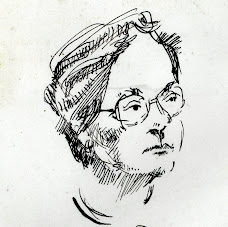As usual, I'm about 4 years late in seeing the Oscar-winning (3 wins out of 8 nominations) film Brokeback Mountain (2005), which was based on a short story by Annie Proulx. As I prefer, I saw the film first, then read the story, courtesy of my Christmas present from Onkel Hankie Pants a few years back -- the complete New Yorker on DVD. (Interviews with director Ang Lee, screenwriter Larry McMurtry, and actor Randy Quaid all mentioned that they had read the story in The New Yorker.)
By now everyone knows that Brokeback Mountain is the story of two young cowboys-turned-sheepherders who fall into a homosexual love affair during a summer on Brokeback Mountain in Wyoming. It's the early 60s when the affair begins, and the two can't admit they're "queer" even to themselves or each other; they know that discovery could mean real physical danger or even death. Their summer of passion over, they go their separate ways. Heath Ledger's character, Ennis, marries and has two children, and he and his wife live a hand-to-mouth existence in small Wyoming ranching towns. Jake Gyllenhaal (Jack) goes on the rodeo circuit and ends up in Texas, where he marries a rich man's daughter and lives his own life of quiet desperation, with occasional forays to Mexico in search of male prostitutes. After several years, Jack and Ennis get back together for a "fishing trip" and continue to meet once or twice a year. It's all that keeps either of them going. Ennis's wife confirms what she has long suspected about him, divorces and marries the local grocer. It all ends tragically. These guys can't just decide to move to San Francisco or New York, although that would have been a possibility by the end of the film. Their tragedy is almost as much about their social class, their rural upbringing, their lack of education, and their inability to imagine another kind of life, as it is about their sexuality. It's their class and economic issues that place Jack in position to be killed.
Reading the short story, I was struck by the film's faithfulness to it. The screenwriters (McMurtry and his writing partner Diana Ossana) used many lines of dialogue straight out of Proulx's story. The scenery in the mountains (albeit I understand the filming was in Alberta, not Wyoming) is filmed in a way that makes it a visual representation of Proulx's lyrical description of the land. Although Heath Ledger and Jake Gyllenhaal were much better-looking than the young men described in Proulx's story, they were otherwise quite believable, and the other characters were also well-acted. The passage of time is shown through costumes, props and sets, and I couldn't fault any of it. I'm glad I finally got around to seeing the film and reading the story.
Subscribe to:
Post Comments (Atom)


No comments:
Post a Comment